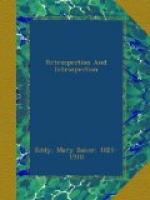From that hour personal corporeality became less to me than it is to people who fail to appreciate individual character. I endeavored to lift thought above physical personality, or selfhood in matter, to man’s spiritual individuality in God,—in the true Mind, where sensible evil is lost in supersensible good. This is the only way whereby the false personality is laid off.
He who clings to personality, or perpetually warns you of “personality,” wrongs it, or terrifies people over it, and is the sure victim of his own corporeality. Constantly to scrutinize physical personality, or accuse people of being unduly personal, is like the sick talking sickness. Such errancy betrays a violent and egotistical personality, increases one’s sense of corporeality, and begets a fear of the senses and a perpetually egotistical sensibility.
He who does this is ignorant of the meaning of the word personality, and defines it by his own corpus sine pectore (soulless body), and fails to distinguish the individual, or real man from the false sense of corporeality, or egotistic self.
My own corporeal personality afflicteth me not wittingly; for I desire never to think of it, and it cannot think of me.
PLAGIARISM
The various forms of book-borrowing without credit spring from this ill-concealed question in mortal mind, Who shall be greatest? This error violates the law given by Moses, it tramples upon Jesus’ Sermon on the Mount, it does violence to the ethics of Christian Science.
Why withhold my name, while appropriating my language and ideas, but give credit when citing from the works of other authors?
Life and its ideals are inseparable, and one’s writings on ethics, and demonstration of Truth, are not, cannot be, understood or taught by those who persistently misunderstand or misrepresent the author. Jesus said, “For there is no man which shall do a miracle in my name, that can lightly speak evil of me.”
If one’s spiritual ideal is comprehended and loved, the borrower from it is embraced in the author’s own mental mood, and is therefore honest. The Science of Mind excludes opposites, and rests on unity.
It is proverbial that dishonesty retards spiritual growth and strikes at the heart of Truth. If a student at Harvard College has studied a textbook written by his teacher, is he entitled, when he leaves the University, to write out as his own the substance of this textbook? There is no warrant in common law and no permission in the gospel for plagiarizing an author’s ideas and their words. Christian Science is not copyrighted; nor would protection by copyright be requisite, if mortals obeyed God’s law of manright. A student can write voluminous works on Science without trespassing, if he writes honestly, and he cannot dishonestly compose Christian Science. The Bible is not stolen, though it is cited, and quoted deferentially.




